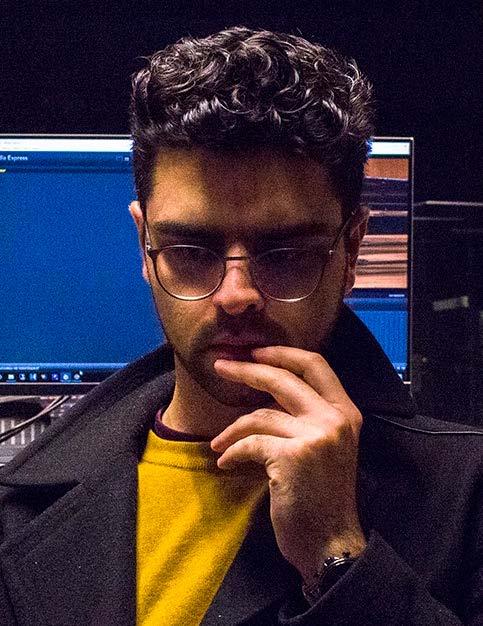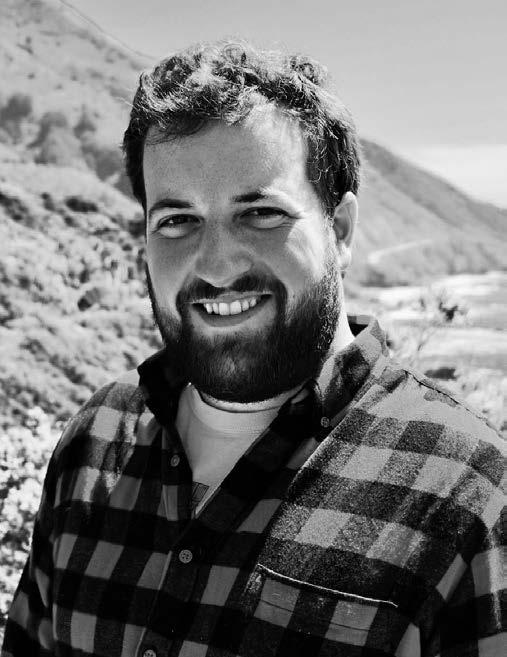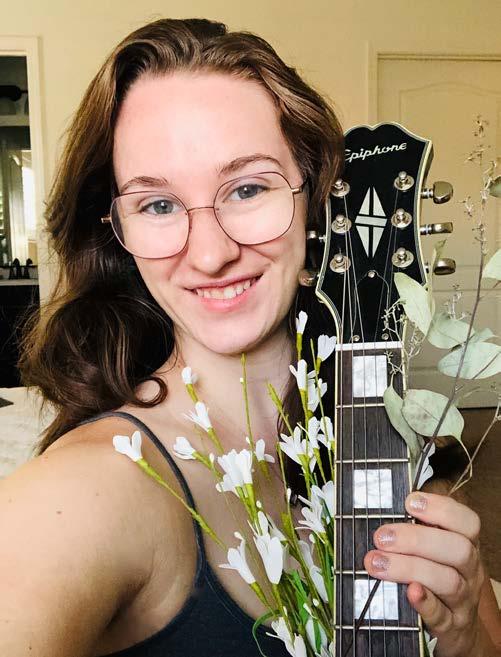
5 minute read
Dorothy and Sherrill C. Corwin Awards
Winners announced for Large Ensemble, Chamber Ensemble, Electronic Music, and a special category for new music duo Transient Canvas
Hosted annually by the UC Santa Barbara Department of Music and generously supported by the Corwin Family Foundation, the Dorothy and Sherrill C. Corwin Awards recognize excellence in music composition, and are open to all UC Santa Barbara undergraduate and graduate student music majors in the Department of Music, the College of Creative Studies, and the Media Arts and Technology Program. The 2021 Awards included four categories: Work for Large Ensemble, Work for Chamber Ensemble, Electronic/Audio-visual Work, plus a special category for Works for Marimba and Bass Clarinet, to be premiered by the duo Transient Canvas. Every year, three external judges are nominated by the Corwin Chair to evaluate student scores and recordings and award prizes linked to monetary rewards, concert performances, and studio recordings. Nominated by Corwin Chair of Composition João Pedro Oliveira, this year’s jury included Elainie Lilios from Bowling Green State University, Ken Ueno from UC Berkeley, Rodrigo Sigal from Centro Mexicano para la Musica y Artes Sonoras, and Amy Advocat and Matt Sharrock of Transient Canvas. Read on to learn more about each of the 2021 Awardees and their works. Artist biographies and links to listen to the pieces are available at music.ucsb.edu/news/announcement/2194.
Rodney DuPlessis, Doctor of Philosophy
First Prize, Work for Chamber Ensemble
Coacervate for violin and electronics

Rodney DuPlessis
“Certain mixtures of polyelectrolytes can spontaneously form dense liquid droplets (called coacervates) suspended in water (dilute phase). These liquid droplets are often filled with complex molecules, proteins, polymers, and nucleic acids. Coacervate formation has been suggested as a possible mechanism through which the first simple cells formed on earth (Abiogenesis). In composing Coacervate, I worked closely with violinist and chemical engineer Chelsea Edwards to create a sonic narrative from this chemistry. Distinct musical motives are inserted into dilute textures where they compartmentalize, chain together like charged polymers, and erupt into the beginnings of life.”
Dariush Derakhshani, Doctor of Philosophy
First Prize, Electronic Music
Pārsa

Dariush Derakhshani
“Pārsa can be categorized as a programmatic piece. The inspiration of its form and direction came from the history of Persepolis and its demolition by Alexander the Great. The initial section is meant to represent a grand sound which is slowly ravaged as the piece continues. What remains by the end are broken parts and pieces representing the slow destruction of Persepolis by fire. The final section (A’) is a distorted memory of the grand sound heard in the beginning which quickly crumbles into a minuscule sound with a high amount of tension in its core.”
Alexandra Jones, Master of Arts

Alexandra Jones
First Prize, Special Category for 2021 (Works for Transient Canvas)
In All My Born Days...
“In All My Born Days... is originally from a collection of five pieces that vary in the way that they allow either the composer or the performer musical freedom and power. In this piece in particular, there is an equal balance between performer and composer; with a large use of improvisation and open scoring the performers have as much say in the music as the composer. Contrasting sections are the very essence of the piece. Musical characters are pinned against each other: angularity and placidness; agitation and equilibrium; competition and harmony. However, the lines between these differences become muddled and the listener is left with an amalgamation. The fight between living and dying is the underlying theme; however, one cannot exist without the other. The combination of the two is life itself. The title comes from a common southern quote that expresses shock at something never before seen; there is nothing more shocking than life.”
Stewart Engart, Doctor of Philosophy

Stewart Engart
First Prize, Special Category for 2021 (Works for Transient Canvas)
A More Sound Outlook ® for bass clarinet and marimba
“A More Sound Outlook ® was composed during the 2020-2021 COVID global pandemic. Unlike other pieces that I composed during this period, which served as a means of escape, I used this piece to document what my life has been for the last year. I began by creating a list of the most common sounds heard around my apartment, then asked my partner to order my list along a spectrum of anxiety that each sound causes. The original list:
The first note of the American The Office theme music; My dog barking; Computer mouse click; Boiling water; Toilet flush; Dishwasher; Toaster; Snoring; Fire Alarm; Santa Ana Winds; Kitchen cabinets slamming; The Microsoft Outlook® email notification.
I analyzed each sound through standard Music Information Retrieval (MIR) techniques, such as, f0 estimation, harmonic spread, noisiness, and power, intending to use all of the sound samples as musical material. Through the composition process, I realized that I had enough material in one, single sound: the sound that caused my partner the most stress, her work email notification. This piece is both composed by data extracted from this stressful sound and serves as a way to recontextualize and remove the anxiety associated with it. The title is a nod to the source material and a hopeful look to the future as the vaccine rollout continues.”
Eric Huang, Bachelor of Music (College of Creative Studies)

Eric Huang
First Prize, Work for Large Ensemble
The Odyssey Suite
“The Odyssey Suite was inspired by the brilliant and evocative orchestration of Holst’s The Planets and by the colorful imagery in Greek mythology. Each movement portrays different events that happen on Odysseus’s journey homeward. While each of the five (ultimately fourteen) movements can stand as separate works, taken together, the suite aims to bring the listener along to experience the journey with Odysseus.” Find the complete program notes at music.ucsb.edu/news/announcement/2194.
Kailee Lencioni, Bachelor of Music (College of Creative Studies)

Kailee Lencioni
First Prize, Work for Chamber Ensemble
Flickering Innocence for piano quartet
“In writing this piece I sought fluidity––the transmutation of tension into light, and pulses of dysphoria into a kind of bittersweet beauty. As I composed the shifting, blending melancholy of this piece, I envisioned many veiled menaces, dancing on the periphery of childhood memories. These are perils unseen, shadowed by a sense of disquiet which swells, ebbing and flowing softly, then growing swiftly to bursting point.
Floating down in a gentle confetti-debris, there is a calmness. There is an echo.”










